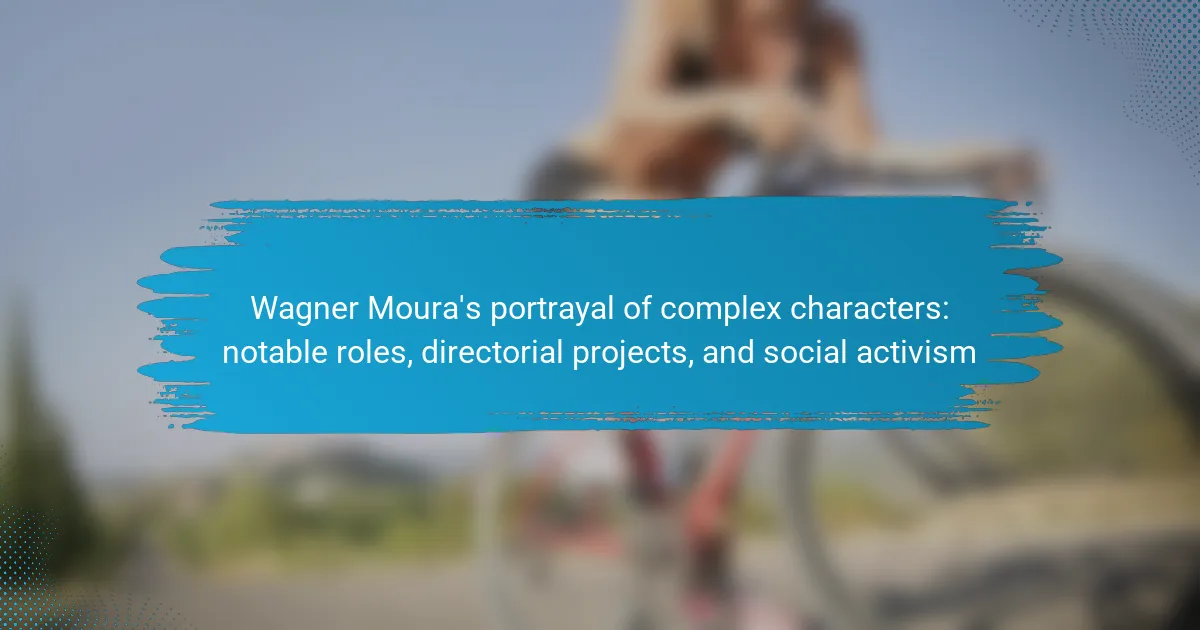Wagner Moura is a prominent Brazilian actor and director known for his portrayal of complex characters and social activism. His performance as Pablo Escobar in the series “Narcos” exemplifies his ability to convey depth and nuance, challenging stereotypes and inviting audience empathy. Moura’s directorial work, including the film “Marighella,” addresses significant social issues and reflects his commitment to impactful storytelling. Additionally, he actively engages in social activism, using his platform to raise awareness about corruption, human rights, and environmental concerns, which further connects him with his audience. This article explores Moura’s notable roles, directorial projects, and his influence on contemporary Brazilian cinema and society.

What makes Wagner Moura’s portrayal of complex characters significant?
Wagner Moura’s portrayal of complex characters is significant due to his ability to convey depth and nuance. He brings authenticity to his roles, often reflecting the multifaceted nature of human experience. Moura’s performance as Pablo Escobar in “Narcos” exemplifies this, showcasing a character that is both charismatic and deeply flawed. His work often challenges stereotypes and invites audiences to empathize with morally ambiguous figures. This complexity encourages viewers to engage critically with the narratives presented. Moura’s dedication to understanding his characters’ motivations enhances the storytelling. His performances have garnered critical acclaim, further solidifying his impact in the industry.
How does Wagner Moura’s background influence his acting choices?
Wagner Moura’s background significantly influences his acting choices. He was born in Brazil, where he grew up in a culturally rich environment. This upbringing instilled in him a deep appreciation for Brazilian history and social issues. Moura often selects roles that reflect complex characters, particularly those facing societal challenges. His experience as a political activist shapes his portrayals, making them more authentic and relatable. Additionally, his education in journalism enhances his ability to research and understand the nuances of his characters. Consequently, Moura’s performances are often infused with a sense of realism and depth, resonating with audiences on multiple levels.
What experiences shaped Moura’s understanding of complex characters?
Wagner Moura’s understanding of complex characters was shaped by his diverse acting roles and cultural background. His portrayal of Pablo Escobar in “Narcos” required deep emotional and psychological insight. Moura studied the intricacies of Escobar’s personality, understanding his motivations and conflicts. Additionally, Moura’s Brazilian heritage exposed him to rich narratives and social issues. His work in Brazilian cinema often highlights multifaceted characters facing societal challenges. These experiences allowed Moura to explore the human condition in depth. His directorial projects further expanded his perspective on character development. Moura’s activism also informs his understanding of complex social dynamics. Through these experiences, he gained a nuanced view of character complexity.
How has his cultural heritage impacted his performances?
Wagner Moura’s cultural heritage has significantly influenced his performances. His Brazilian background informs his portrayal of characters, adding depth and authenticity. Moura often draws on the rich history and social issues of Brazil in his roles. This connection allows him to resonate with local audiences. His performances in “City of God” and “Narcos” showcase Brazilian culture and social dynamics. Additionally, Moura’s understanding of cultural nuances enhances his character development. This cultural perspective enriches his storytelling and performances. Overall, his heritage shapes both the emotional and contextual layers of his work.
What are some of Wagner Moura’s most notable roles?
Wagner Moura is known for several notable roles. He gained international fame for portraying Pablo Escobar in the Netflix series “Narcos.” This role showcased his ability to embody complex characters. Moura’s performance earned critical acclaim and a nomination for a Golden Globe. He also starred in the Brazilian film “Elite Squad” as Captain Nascimento. This film highlighted his talent in action roles. Additionally, Moura played the lead in “The Last Days of Gilda,” further demonstrating his versatility as an actor. His work spans various genres, solidifying his status in the film industry.
Which characters showcase his ability to portray complexity?
Wagner Moura showcases his ability to portray complexity through characters like Pablo Escobar and Captain Nascimento. Pablo Escobar, from the series “Narcos,” is a multifaceted character. He embodies both a ruthless drug lord and a family man. Moura’s performance captures Escobar’s moral ambiguities and emotional depth. Captain Nascimento, from “Elite Squad,” is another complex character. He represents a conflicted police officer battling corruption and personal demons. Moura effectively conveys Nascimento’s struggles with morality and duty. These roles highlight Moura’s skill in depicting nuanced characters with rich inner lives.
How do these roles reflect societal issues?
Wagner Moura’s roles reflect societal issues by addressing themes of violence, inequality, and corruption. His portrayal of complex characters often highlights the struggles faced by marginalized communities. For example, in “City of God,” he showcases the impact of poverty on youth. This film illustrates the cycle of crime and despair in Brazilian favelas. Additionally, in “Narcos,” Moura depicts the drug trade’s influence on society. The series raises awareness about the consequences of drug policies. Moura’s directorial projects similarly tackle social injustices. His activism further emphasizes the need for change in societal structures. These roles and projects collectively mirror pressing societal challenges.
What themes recur in Wagner Moura’s performances?
Wagner Moura’s performances frequently explore themes of moral ambiguity and social justice. His roles often depict characters grappling with ethical dilemmas. Moura’s portrayal of Pablo Escobar in “Narcos” highlights the complexities of power and corruption. He also embodies the struggle against systemic injustice in films like “Aquarius.” Moura’s characters often reflect the socio-political realities of Brazil. He emphasizes the human side of controversial figures. This approach invites audiences to empathize with flawed individuals. Overall, Moura’s work challenges viewers to confront difficult societal issues.
How does he approach the moral ambiguity of his characters?
Wagner Moura approaches the moral ambiguity of his characters by delving deeply into their psychological complexities. He often portrays characters that exist in gray areas of morality. This allows audiences to empathize with their struggles and dilemmas. Moura emphasizes human flaws and vulnerabilities, showcasing how circumstances shape decisions. His performances often reflect conflicting motivations and ethical uncertainties. For instance, in his role as Pablo Escobar, he presents a multifaceted character who embodies both charisma and brutality. This layered portrayal invites viewers to question their judgments. Moura’s directorial projects also explore similar themes, reinforcing his commitment to nuanced storytelling.
What emotional depth does he bring to his roles?
Wagner Moura brings significant emotional depth to his roles through his nuanced performances. He effectively conveys complex emotions, allowing audiences to connect with his characters. Moura’s portrayal of Pablo Escobar in “Narcos” showcases his ability to embody both charisma and vulnerability. This duality creates a compelling character that resonates with viewers. His work in “Elite Squad” highlights his skill in portraying moral ambiguity and internal conflict. Critics often praise his performances for their authenticity and emotional resonance. Moura’s dedication to character development enhances the depth of his roles. His ability to evoke empathy is a hallmark of his acting style.

How has Wagner Moura contributed to film and television as a director?
Wagner Moura has made significant contributions to film and television as a director. He directed the acclaimed film “Marighella,” which highlights Brazilian political history. The film showcases his ability to address complex social issues through cinema. Moura’s direction received praise for its bold storytelling and visual style. He also directed episodes of the popular series “Narcos,” where he portrayed Pablo Escobar. His work as a director reflects his commitment to impactful narratives. Moura’s projects often focus on themes of resistance and identity. His contributions have influenced contemporary Brazilian cinema and television.
What directorial projects has he undertaken?
Wagner Moura has directed several notable projects. He made his directorial debut with the film “Marighella” in 2019. This film is based on the life of Brazilian revolutionary Carlos Marighella. “Marighella” received critical acclaim and highlighted Moura’s skill as a director. Additionally, Moura has directed episodes for the television series “The Mechanism.” This series explores corruption in Brazil. His directorial work often reflects his commitment to social issues.
How do his directorial works reflect his vision as a storyteller?
Wagner Moura’s directorial works reflect his vision as a storyteller through their focus on complex narratives and character development. His films often explore themes of social justice and human emotion. Moura emphasizes authenticity and cultural context in his storytelling. For example, his directorial debut, “Marighella,” showcases the life of a Brazilian revolutionary. This film highlights resistance against oppression, illustrating his commitment to social issues. Moura’s narrative style often incorporates personal and political elements. He aims to engage audiences in meaningful conversations about society. Overall, his directorial approach reveals a deep understanding of human experiences and societal challenges.
What themes does he explore through his directorial lens?
Wagner Moura explores themes of social justice, identity, and human complexity through his directorial lens. His works often highlight the struggles of marginalized communities. Moura emphasizes the intricacies of personal and societal conflicts. He delves into the moral ambiguities of his characters. This exploration reflects broader social issues in Brazil. His films often challenge viewers to confront uncomfortable truths. Moura’s storytelling is rooted in authenticity and realism. These themes resonate with audiences, prompting critical discussions.
How does Moura’s directorial style compare to his acting?
Wagner Moura’s directorial style emphasizes visual storytelling and character depth, similar to his acting. In his directorial work, Moura focuses on nuanced performances and emotional authenticity. This approach mirrors his acting, where he portrays complex characters with rich inner lives. His direction often showcases strong character arcs and interpersonal dynamics, akin to his acting style. For instance, in his directorial debut “Marighella,” he emphasizes the protagonist’s motivations and struggles, reflecting his own experience as a performer. Moura’s ability to blend storytelling with character exploration is evident in both his directorial and acting careers, highlighting a cohesive artistic vision.
What techniques does he use to portray complex narratives?
Wagner Moura employs various techniques to portray complex narratives. He utilizes deep character analysis to understand motivations. Moura often draws on real-life experiences for authenticity. He integrates emotional depth through nuanced performances. Moura also uses non-linear storytelling to enhance complexity. His collaborations with skilled writers enrich narrative layers. He leverages visual symbolism to convey deeper meanings. Moura’s directorial approach emphasizes character-driven storytelling. These methods collectively create compelling and multifaceted narratives.
How does he collaborate with actors to enhance character depth?
Wagner Moura collaborates with actors by engaging in deep discussions about character motivations. He encourages actors to explore their characters’ backgrounds and emotions. Moura often shares his own interpretations and insights to foster a collaborative environment. He values input from actors to create authenticity in performances. This approach leads to richer character portrayals. Moura’s experience in acting informs his directorial decisions. He utilizes improvisation to allow actors to discover their characters organically. This method enhances the overall depth and complexity of the characters in his projects.

What role does social activism play in Wagner Moura’s career?
Social activism plays a significant role in Wagner Moura’s career. He uses his platform to address social issues in Brazil. Moura has been vocal about topics like corruption, human rights, and environmental concerns. His activism aligns with his artistic choices, often reflecting societal struggles in his work. For instance, in his role as Pablo Escobar in “Narcos,” he highlighted the impact of drug trafficking on communities. Moura also directed the film “Marighella,” which focuses on resistance against oppression. Through his activism, he engages audiences and raises awareness about critical issues. This commitment enhances his public image and connects him with fans who value social responsibility.
How has Moura used his platform for social change?
Wagner Moura has utilized his platform for social change by advocating for various social issues. He has been vocal about human rights, environmental protection, and political activism in Brazil. Moura uses his visibility as an actor to raise awareness on these critical matters. He participated in campaigns against deforestation in the Amazon. Moura has also spoken out against police violence and corruption in Brazil. His role in the series “Narcos” further highlighted issues related to drug trafficking and its societal impacts. Through interviews and public appearances, he emphasizes the importance of social justice. Moura’s activism has garnered significant media attention, amplifying his message.
What causes does he advocate for, and why are they important?
Wagner Moura advocates for social justice and environmental protection. He emphasizes the importance of addressing inequality in Brazil. Moura highlights the impact of climate change on vulnerable communities. His activism raises awareness about human rights issues. These causes are crucial for promoting equity and sustainability. They aim to protect marginalized groups and future generations. Moura’s efforts contribute to a broader conversation about systemic change. His advocacy inspires others to engage in social and environmental issues.
How does his activism influence his artistic choices?
Wagner Moura’s activism significantly influences his artistic choices. His commitment to social justice shapes the roles he selects. He often portrays characters that reflect societal issues. For example, his role in “Narcos” highlights the complexities of drug trafficking and its impact on society. Moura also directs projects that address social inequalities. His film “Marighella” focuses on resistance against oppression. This choice showcases his dedication to political themes. Moura’s activism informs his storytelling approach and character development. His work aims to provoke thought and inspire change in audiences.
What impact has Moura’s activism had on public perception?
Moura’s activism has significantly influenced public perception regarding social issues in Brazil. He has raised awareness about topics like environmental protection and human rights. His vocal stance against political corruption resonated with many citizens. Moura’s participation in protests has amplified calls for change. His social media presence has further spread his messages to a wider audience. Public support for his causes has grown as a result of his efforts. This activism has fostered a more engaged and informed public. Consequently, Moura is seen not just as an actor but also as a crucial voice for social change.
How has he addressed social issues through his work?
Wagner Moura has addressed social issues through his work by portraying complex characters that reflect societal challenges. In the series “Narcos,” he depicted the impact of drug trafficking on communities. This role highlighted issues such as violence and corruption in Colombia. Moura also directed the film “Marighella,” which addresses Brazil’s political struggles and resistance movements. His activism includes participation in protests advocating for human rights and social justice. Moura uses his platform to raise awareness about inequality and systemic issues in Brazil. His work consistently emphasizes the importance of storytelling in addressing social realities.
What reactions has he received from audiences and critics?
Wagner Moura has received widespread acclaim from both audiences and critics for his performances. His role as Pablo Escobar in “Narcos” was particularly praised, earning him a nomination for the Primetime Emmy Award. Critics highlighted his ability to portray complex emotions and moral ambiguity effectively. Audiences resonated with his authentic representation of Escobar, leading to a significant fan following. Moura’s directorial debut, “Marighella,” also garnered positive reviews, showcasing his versatility in storytelling. Critics noted his unique vision and commitment to social issues, further enhancing his reputation in the industry. His performances consistently evoke strong reactions, reflecting his impact on contemporary cinema.
What can aspiring actors learn from Wagner Moura’s approach to complex characters?
Aspiring actors can learn the importance of deep character analysis from Wagner Moura’s approach to complex roles. He emphasizes understanding the psychological motivations behind each character. Moura immerses himself in the backstory and emotional landscape of his characters. This thorough preparation enhances authenticity in performance. He also showcases the value of versatility by taking on diverse roles across genres. Moura’s work demonstrates the impact of social context on character development. By portraying multifaceted individuals, he encourages actors to explore moral ambiguities. This approach can lead to more nuanced and compelling performances.
How can they develop their understanding of character depth?
They can develop their understanding of character depth by analyzing multifaceted roles. Wagner Moura’s performances in series like “Narcos” and films like “Elite Squad” showcase complex characters. Observing the motivations, conflicts, and transformations within these roles reveals depth. Engaging with character backstories enhances comprehension of their emotional landscapes. Additionally, studying Moura’s directorial choices offers insights into character development. Analyzing audience reactions provides further understanding of character impact. This multifaceted approach fosters a richer appreciation of character depth.
What practices can they adopt to enhance their performances?
Actors can adopt various practices to enhance their performances. Consistent training in acting techniques improves skills significantly. Engaging in workshops allows actors to explore different styles and methods. Regular practice through rehearsals helps solidify their craft. Receiving feedback from directors and peers fosters growth and refinement. Studying diverse characters broadens their understanding of complex roles. Observing real-life situations enhances authenticity in performances. Finally, maintaining physical and mental health supports overall performance quality.
Wagner Moura is the primary entity of this article, which examines his significant contributions to film and television through his portrayal of complex characters, notable roles, directorial projects, and social activism. The article highlights Moura’s ability to convey depth and nuance in characters such as Pablo Escobar in “Narcos” and Captain Nascimento in “Elite Squad,” showcasing his skill in reflecting societal issues. It also discusses how his Brazilian heritage and background as a political activist influence his acting and directing choices, as well as the themes of social justice and moral ambiguity prevalent in his work. Additionally, the article addresses the impact of Moura’s activism on public perception and his commitment to raising awareness about critical social issues.
